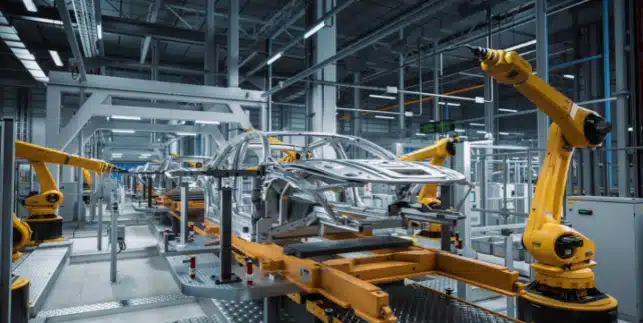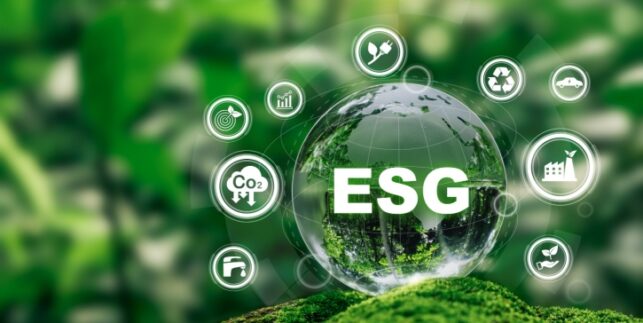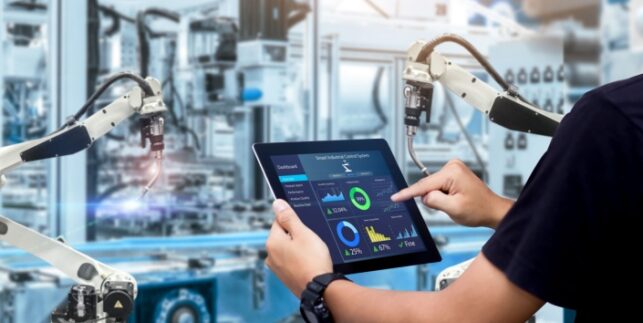
The automotive industry is going through a rapid change driven by new technologies, regulations, and challenges. The COVID-19 pandemic and supply chain issues saw global automotive manufacturing take a major hit. However, the industry is not only seeing signs of recovery – but is also building back better with many new approaches to emerging and existing challenges.
Regulatory Changes Changing the Automotive Industry Today
Automotive manufacturing makes up 3% of the global GDP, accounting for nearly $3 trillion in economic output in 2022. Its central importance to economies around the world and the function of other industries has led to many regulations being implemented to safeguard, control, and guide its development.
Regulations focus on the growth and resilience of the industry, along with the safety and environmental sustainability of the vehicles they create. Over the past few years, regulations have begun to focus more directly on the sustainability of manufacturing itself rather than direct emissions from vehicle use alone.
New Vehicle Emissions Standards
The United States Environmental Protection Agency (EPA) released its greenhouse gas emissions standards for passenger cars and light trucks running through to the model year 2026. The schedule significantly increases requirements, with the expected result of reducing greenhouse gas emissions by 3 billion tons.
These changes will result in the average fuel economy of new vehicles reaching 40 MPG by the model year 2026. The new goal supersedes the existing requirement to attain 32 MPG by that time.
Pushing Consumers Towards Electric Vehicles
The US Inflation Reduction Act of 2022 is among the most significant laws of the past several years, with a major impact on economic and energy policy. The act introduced a variety of tax credits focused on renewable energy and sustainability. This includes a $7,500 federal income tax credit for the purchase of new electric vehicles (EVs).
There are many conditions to this benefit, including that batteries be manufactured in North America to stimulate regional growth in that sector. This and other benefits mean that manufacturers need to have accurate and traceable data on where components for individual vehicles come from.
Building Stronger Automotive Manufacturing Supply Chains
The National Strategy for Advanced Manufacturing announced on October 7th, 2022, is also expected to have a major impact on the automotive industry over the coming years. While the strategy itself doesn’t put measures into place, it will serve as a guiding document for many key federal agencies.
One of the strategy’s key goals is to develop more reliable and robust supply chains for manufacturing across all industries. As an industry that has been uniquely impacted by supply chain challenges, the focus on improved collaboration and transparency across supply chains may significantly impact automotive manufacturers.
The July 2022 CHIPS and Science Act is also set to have a major impact. While supplies are improving, the automotive industry is still experiencing a shortage of essential semiconductor chips. These chips have proven to be a serious bottleneck, throttling production across the industry. The act has allocated more than $40 billion in investments for chip manufacturing in the US.
Electric Vehicles Continue to Grow Throughout the Industry
The industry is changing in many ways, and one of the most significant is the emergence of EVs as a genuine competitor for conventional gasoline and diesel options. According to Forbes, Q2 2022 EV sales made up 5.6% of the total market, more than double the 2.7% reached in Q2 2021.
There are many driving factors behind this trend. Increasing gas prices over the past few years have likely contributed. However, growth has shown a consistent trend over the past ten years, which included an extended period of relatively low gas prices.
China has been a major driver in EV sales trends, accounting for more than half of EV sales. Germany and the US are the next largest markets, accounting for around 10% of sales each.
More than 30 countries voiced their commitment to 100% zero-emissions new vehicle sales by 2040 at the 2021 UN Climate Change Conference in Glasgow. While this shows significant support for EVs and other alternatives, there are few examples of governments signing such a plan into law.
While the US has stated a goal of reaching 40 to 50 percent EV market share by 2030, there aren’t any planned regulatory deadlines that would restrict the manufacture or sale of conventional gas or diesel vehicles.
Instead, much of the growth in EV sales has been driven by improvements in technology and consumer options. As traditional automakers have begun introducing EVs into their main lines, the number of options for consumers has risen consistently.
Battery technology has allowed for more affordable and longer-lasting batteries, one of the primary challenges in EV manufacturing. Many EV models can now compete in performance and price with conventional models, making them a viable option for a wider range of consumers.
New Approaches to Automotive Manufacturing Sustainability
Sustainability is one of the most important topics in automotive manufacturing today. Manufacturers worldwide are making changes in vehicle design and manufacturing practices to reduce lifecycle emissions – many with the goal of reaching net zero in the future.
According to the Zemo Partnership, an organization working toward net-zero emissions in transportation, a standard gasoline vehicle incurs 23% of its lifecycle emissions during production. For EVs, production accounts for 46% of lifetime emissions.
During manufacturing, material emissions and energy use both contribute to emissions. While fuel economy has been a major focus for decades, it is now clear that emissions during production must be addressed as well. Manufacturers are making improvements in several areas to reduce emissions during production.
Achieving Circular Economy
Automotive manufacturing relies on a variety of materials to produce vehicles, largely steel, aluminum, and plastics. Each of these is responsible for a certain amount of material emissions. Plastics are almost always derived from fossil fuels, and steel produces significant emissions during processing.
These emissions can be significantly reduced by achieving a circular economy where more recycled materials are used with less reliance on virgin materials. The emissions created during the recycling of steel and plastics are much less than those produced during their initial refinement and processing.
In an ideal circular economy, all materials involved in the production of a vehicle are recovered and recycled at its end of life. This ideal may not be possible in practice, as many parts and components cannot be made with 100% recycled materials. They need a certain amount of virgin material to ensure strength, durability, and other key requirements.
However, automotive manufacturers are taking steps to move much closer to a circular economy. This includes the increased use of recycled materials and more effective capture of end-of-life vehicles. For EVs, developing new methods for efficient battery recycling is also a significant challenge to overcome.
Achieving a circular economy can dramatically reduce emissions during production, and this will play a key role as automotive manufacturers move toward net-zero emissions. While some emissions will still be produced for the foreseeable future, the cycling of other components from end-of-life vehicles can serve to offset those emissions and potentially reach net zero.
Ensuring Accurate Recycled Content Accounting
Much of the drive to improve the effectiveness and extent of recycling in automotive manufacturing comes from within the industry. The Automotive Industry Action Group, in collaboration with the Suppliers Partnership for the Environment, has released a guide titled Measuring Recycled Content of Automotive Products.
The guide seeks to break down accurate accounting of recycled material content for the automotive manufacturing process. It takes a holistic view of the manufacturing process, including the impact of virgin materials, the process itself, assemblers, part manufacturers, and the end user.
As the focus on recycled materials in the automotive industry continues to increase, manufacturers must ensure that they have accurate accounting. This includes understanding recycled content in parts and materials from other manufacturers, downstream processes, and secondary processes.
Omitting any of these sources from the final accounting of recycled materials will mean that manufacturers are understating the sustainability of their vehicles. This means that they can’t capitalize on improved public perception or potential tax benefits. It could even lead to the inaccurate application of regulatory fines and levies.
Energy Consumption Management
Emissions associated with the production of virgin raw materials are a vital area to address, but the energy used directly in manufacturing operations also contributes to emissions. The wide range of machines in use throughout any automotive plant consumes energy and managing that consumption can allow manufacturers to reduce their overall emissions.
Developing a better understanding of energy consumption is the first step to improving management. Automotive manufacturers need solutions that let them evaluate energy consumption in real time so they can accurately link spikes in consumption with events on their production lines. Doing so allows them to take action to resolve issues or plan to prevent those issues in the future.
Optimizing energy consumption management also requires a certain level of granularity in production data. Automotive manufacturers can now take advantage of IoT technology and other solutions to monitor the energy consumption of individual machines. This enables automotive manufacturers to pinpoint sources of energy loss and better understand energy consumption on their production line.
How Automotive Manufacturers Can Implement These Changes
The automotive manufacturing industry is going through changes as a whole, but these changes also occur within individual facilities and production lines. Automotive manufacturers need a solution for the practical implementation of these sustainability principles.
Real-time aggregation and analysis of production data are essential elements of any such solution. Manufacturers need to know what’s happening on their production floor and ensure that it stays in line with their material and energy consumption goals.
With real-time monitoring, manufacturers can be instantly notified of quality issues, energy consumption issues, and other problems affecting production. They can have the appropriate stakeholders take fast, decisive action to mitigate losses.
Complete data aggregation for every vehicle also lets manufacturers demonstrate recycled content and materials emissions data. Manufacturers can track the data they need to demonstrate regulatory compliance and prove just how sustainable their operations are.
The right solution also focuses on continuous improvement. Aggregating and analyzing data over time can provide powerful insights to improve the setup, production scheduling, and processes. Facilities become more efficient, saving time, labor, materials, and energy – ultimately improving both sustainability and profitability.
Stay Ahead of Industry Trends With Matics
Matics Real-time Operational Intelligence (RtOI) is a solution that lets manufacturers keep pace with and exceed the changes happening throughout the industry. Real-time aggregation and analysis provide your team with the insight they need to act decisively, letting your production line reach its sustainability goals. Reach out today to see how Matics RtOI can help your production line meet the highest industry standards.





